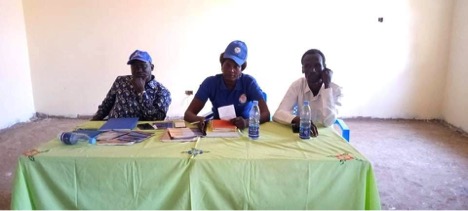
UN reveals a “tip of the iceberg” in South Sudan corruption

By Deng Machol
South Sudan’s Minister of Cabinet Affairs, Martin Elia Lomuro summoned the media in Juba after a Kenyan court cleared him this week of allegations of unlawful money laundering.
Lomuro who has been sanctioned by the United States for obstructing the reconciliation process and peace talks in South Sudan was facing an account freeze at the Cooperative Bank of Kenya.
His is one case being monitored by the international community in South Sudan were billions of dollars are suspected to be stolen by the country’s elites.
Lomuro now prides in a turnaround were the High Court reversed the freeze and he can access his millions.
While Lomuro was busy with journalists in Juba on Thursday over a turnaround in his case, the United Nations Commission on Human Rights in South Sudan was releasing another epic report of corruption, revealing that $73 million have been diverted by the county’s elites since 2018, with almost $39m stolen over a period of less than two months.
The commission was quick to acknowledge in the report that the $73 million was just a fraction of the overall amount looted, referring to President Salva Kiir admitting in 2012 that South Sudan’s governing elites had diverted more than $4 billion.
“The Commission’s documentation of the corruption, embezzlement, bribery, and misappropriation of State funds by political elites is merely the tip of the iceberg,” the commision’s chairperson Yasmin Sooka said in the report.
“Our investigations traced exactly how this money is being diverted, and our findings revealing the patterns and trends of the embezzlement include the involvement of politicians, government officials, international corporations, military personnel, and multinational banks in these crimes,” she said.
“The Ministry of Finance and Economic Planning, the National Revenue Authority, and a number of foreign corporations have all been complicit in this.”
Extreme plundering of South Sudan’s public coffers is undermining human rights and stability in the East African nation and threatening its already fragile peace process, according to the report.
That peace process is meant to end six years of crisis which left 400,000 people dead and displaced four million others.
It slashed the production of crude oil, the country’s sole revenue source and led to economic chaos.
Corruption in the country is a new fashion, John Laku Modi told Juba Echo in the capital Juba.
“Our leaders pride in it and believe you are a coward and weakling if you do not steal money,” Modi who runs a shop said.
The vice has led to stalled progress in building South Sudan and even service deliveries cannot be provided by the government.
It relies on nongovernmental organisations for health provisions, providing clean water and even food for people whose livelihoods have been eroded by the crisis.
In Juba, V8s of the elites adorn the streets, with every new model quickly imported as they are rolled out.
The UN Commission said a staggering amount of money and other wealth had been “diverted from public coffers and resources” by those V8 importers.
Lomuro, who heads all the ministers in the country however said he is very innocent while retorting to the case in Kenya.
“If it was not the person that I am, highly integral, confident and focused, this case would have inflicted permanent damaging psychological trauma in me and my entire family,” he told journalist.
Despite being “accused and taken to court for money laundering as a sitting first minister, minister of cabinet affairs, absolutely without a shred of evidence” Lomuro said he “will not be scared or threatened.”
The UN Commission though believes the South Sudanese elites employ all tricks to steal from the public coffers.
It accused them of deliberately adopting a “highly informal” system of oil revenue collection without independent oversight and transparency that is enabling the misappropriation of public funds.
The commission said the illicit gains from oil and economic crimes also serve as a major driver of armed conflict in South Sudan.




































